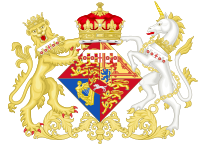Princess Augusta of Great Britain facts for kids
Quick facts for kids Augusta of Great Britain |
|||||
|---|---|---|---|---|---|
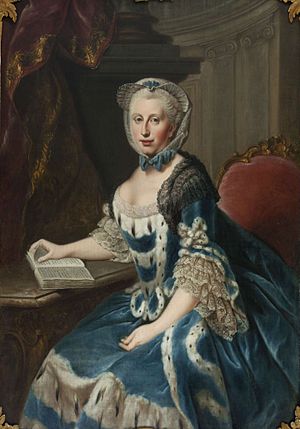
Portrait by Johann Georg Ziesenis
|
|||||
| Duchess consort of Brunswick-Lünenburg Princess consort of Brunswick-Wolfenbüttel |
|||||
| Tenure | 26 March 1780 – 10 November 1806 | ||||
| Born | 31 July 1737 St James's Palace, London |
||||
| Died | 23 March 1813 (aged 75) Hanover Square, London |
||||
| Burial | 31 March 1813 Royal Vault, St George's Chapel, Windsor Castle |
||||
| Spouse | |||||
| Issue Details |
|
||||
|
|||||
| House | Hanover | ||||
| Father | Frederick, Prince of Wales | ||||
| Mother | Augusta of Saxe-Gotha-Altenburg | ||||
Augusta of Great Britain (born July 31, 1737 – died March 23, 1813) was a British princess. She was the granddaughter of King George II and the older sister of King George III. She became the Duchess of Brunswick-Lüneburg and Princess of Brunswick-Wolfenbüttel when she married Charles William Ferdinand, Duke of Brunswick. Her daughter, Caroline, later married King George IV.
Contents
Early Life of Princess Augusta
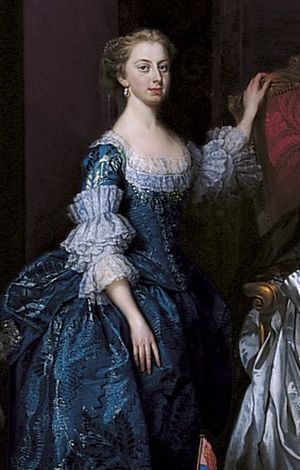
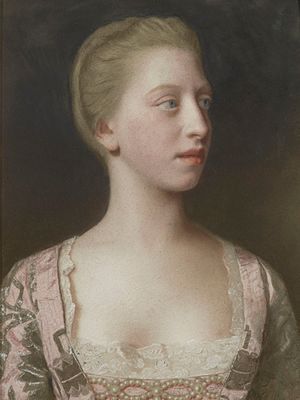
Princess Augusta was born at St James's Palace in London. She was the first child of Frederick, Prince of Wales. This made her the first grandchild of King George II and Queen Caroline of Ansbach.
At birth, Augusta was second in line to the British throne. However, this changed a year later in 1738. Her younger brother, Prince George, was born. He later became King George III.
Fifty days after her birth, Augusta was christened at St. James's Palace. The ceremony was led by the Archbishop of Canterbury, John Potter. Her godparents included her grandfather, King George II. Her grandmothers, Queen Caroline and the Dowager Duchess of Saxe-Gotha, were also godparents.
Augusta's third birthday was celebrated in a special way. The famous song "Rule, Britannia!" was performed for the very first time. This happened at Cliveden in Buckinghamshire. Augusta received a very good education. She was not known for being especially beautiful.
Marriage Plans
In 1761 and 1762, there were talks about Augusta marrying her second cousin. This was Charles William Ferdinand, Duke of Brunswick-Wolfenbüttel. The discussions were put on hold for a while. This was because Augusta's mother did not like the Brunswick family.
On January 16, 1764, Augusta married Charles William Ferdinand. The wedding took place at the Chapel Royal in St James's Palace. After the wedding, there was a grand state dinner. It was held at Leicester House.
The British Parliament sent their congratulations to the couple. A ball was hosted by the Queen, and an opera was performed. The couple left England from Harwich on January 26.
Life in Brunswick
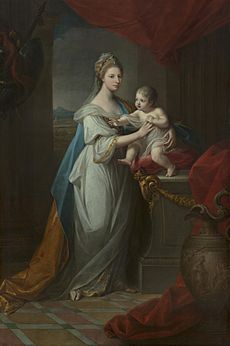
The Duchess Augusta found it hard to get used to life in Brunswick. She always thought very highly of Great Britain. She often looked down on anything "east of the Rhine River." This feeling never changed, even after many years.
Twenty-five years after her marriage, people still described her this way. They said she was "wholly English" in her tastes and manners. Her strong independence was very different from the formal rules of German courts.
Visits to England
After her first child was born in 1764, Augusta returned to Great Britain. Her husband came with her. She wanted to give birth to her second child in England. While they were in England, crowds cheered for the couple. This happened every time they appeared in public.
However, this public support made them seem suspicious at court. Queen Charlotte, Augusta's sister-in-law, reportedly refused them some royal honors. This included military salutes. This made the Queen look bad to the public. Years later, Augusta told a British diplomat that Queen Charlotte was jealous of her. This jealousy started during their 1764 visit.
Augusta found her mother-in-law's court quite boring. This was especially true in the summer. Her husband was often away at military camps. A special summer home was built for her. It was in the southern part of Braunschweig. The home was called Schloss Richmond. It was named to remind her of England.
At her retreat, Augusta enjoyed her days. She would have large lunches, gossip, and play cards. She often welcomed English guests.
Augusta and Charles's marriage was arranged for royal family reasons. However, Augusta initially liked Charles very much. She thought he was very handsome. Soon after her first daughter was born, she wrote about their good relationship. She said they lived well together and she would do anything for him. She seemed unaware of his flirtations in London.
In 1771 and 1772, Augusta visited England again. Her mother had invited her. During this visit, she had another disagreement with Queen Charlotte. Augusta was not allowed to stay at Carlton House or St. James Palace. These palaces were empty at the time. Instead, she had to stay in a small house on Pall Mall.
The Queen and Augusta disagreed about royal manners. The Queen also refused to let Augusta see her brother, the King, alone. According to Mr. Walpole, the Queen's jealousy was the reason. Augusta was present at her mother's deathbed during her second visit. When she returned to Brunswick, she continued her period of mourning. This led her to withdraw from court life.
Later Life in Brunswick
In 1777, Augusta told her husband she would stop participating in court life. She wanted to focus on raising their children. She also wanted to study religion with the Bishop of Fürstenberg. This decision came because she did not approve of Charles's relationship with Louise Hertefeld. Unlike his previous mistress, Louise had become his official royal mistress at the Brunswick court.
In 1780, Charles became the Duke of Brunswick after his father died. Augusta then became the Duchess consort. Of Augusta's four sons, the eldest three faced health challenges from birth.
Later Life and Return to England
In 1806, Prussia declared war on France. Augusta's husband, the Prince of Brunswick-Wolfenbüttel, was 71 years old. He was made the commander-in-chief of the Prussian army. On October 14 of that year, a major battle took place. At the Battle of Jena, Napoleon defeated the Prussian army. On the same day, at the Battle of Auerstadt, the Prince was badly wounded. He died a few days later.
Augusta, along with her son and daughter-in-law, fled to Altona. They were there by her dying husband's side. The French army was advancing quickly. The British ambassador advised them to escape. They left shortly before the Prince passed away.
They were invited to Sweden by the King, Gustav IV Adolf of Sweden. However, Augusta preferred to stay in the Duchy of Augustenborg. Her nephew-in-law was the ruler there. She stayed with her niece, the Duchess of Augustenborg. This niece was the daughter of Augusta's late sister, Queen Caroline Mathilde of Denmark.
Augusta remained there until September 1807. Finally, her brother, King George III, allowed her to come to London. She lived at Montagu House in Blackheath. Her daughter, the Princess of Wales, lived with her. But Augusta soon had a disagreement with her daughter. She then bought the house next door, called Brunswick House. Augusta lived there for the rest of her life. She died in 1813 at the age of 75. She was buried in the Royal Vault at St George's Chapel, Windsor Castle.
Royal Symbols
Augusta was allowed to use the royal symbols of the kingdom. These symbols were slightly changed to show her connection. Her coat of arms included a special white band with five points. The middle point had a red cross, and the other points each had a red rose.
Children of Augusta
Augusta and Charles had seven children together:
| Name | Birth | Death | Notes |
|---|---|---|---|
| Duchess Augusta | 3 December 1764 | 27 September 1788 | married 1780, Duke Frederick of Württemberg; had children |
| Hereditary Prince Karl Georg | 8 February 1766 | 20 September 1806 | married 1790, Princess Louise of Orange-Nassau; no children |
| Duchess Caroline | 17 May 1768 | 7 August 1821 | married 1795, George IV of the United Kingdom; had children |
| Duke Georg William | 27 June 1769 | 16 September 1811 | Had health challenges; not in line for the throne |
| Duke August | 18 August 1770 | 18 December 1822 | Had health challenges; not in line for the throne |
| Duke Frederick William | 9 October 1771 | 16 June 1815 | married 1802, Princess Marie of Baden; had children |
| Duchess Amelie | 22 November 1772 | 2 April 1773 |
See also
 In Spanish: Augusta de Gran Bretaña para niños
In Spanish: Augusta de Gran Bretaña para niños
 | Isaac Myers |
 | D. Hamilton Jackson |
 | A. Philip Randolph |


